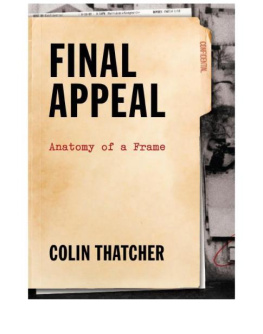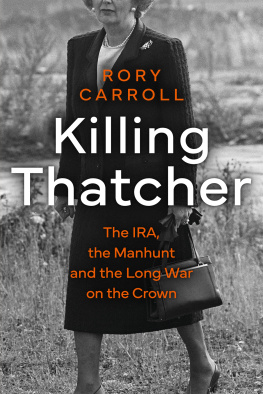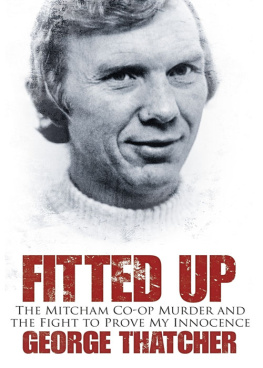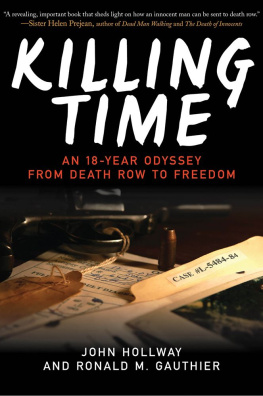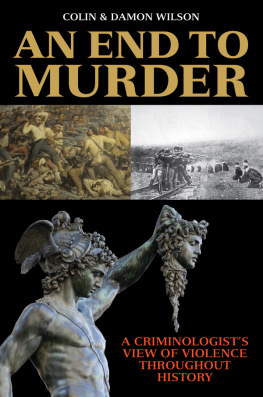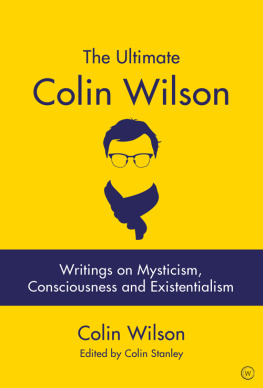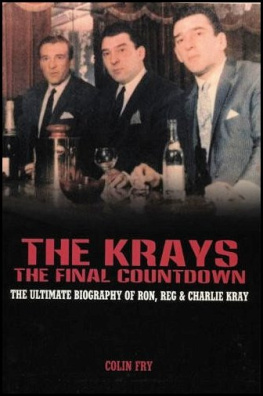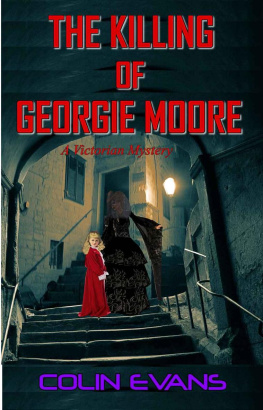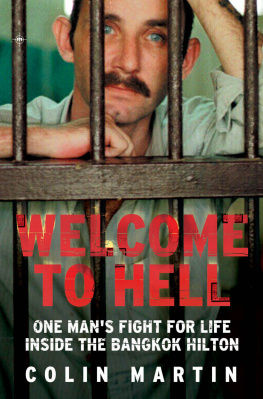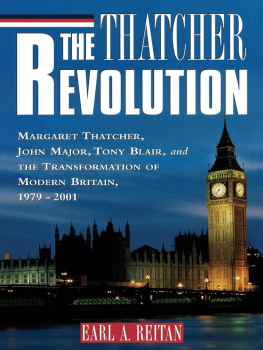Colin Thatcher - Final Appeal. Anatomy of a Frame
Here you can read online Colin Thatcher - Final Appeal. Anatomy of a Frame full text of the book (entire story) in english for free. Download pdf and epub, get meaning, cover and reviews about this ebook. year: 2010, publisher: ECW Press, genre: Detective and thriller. Description of the work, (preface) as well as reviews are available. Best literature library LitArk.com created for fans of good reading and offers a wide selection of genres:
Romance novel
Science fiction
Adventure
Detective
Science
History
Home and family
Prose
Art
Politics
Computer
Non-fiction
Religion
Business
Children
Humor
Choose a favorite category and find really read worthwhile books. Enjoy immersion in the world of imagination, feel the emotions of the characters or learn something new for yourself, make an fascinating discovery.
- Book:Final Appeal. Anatomy of a Frame
- Author:
- Publisher:ECW Press
- Genre:
- Year:2010
- Rating:5 / 5
- Favourites:Add to favourites
- Your mark:
- 100
- 1
- 2
- 3
- 4
- 5
Final Appeal. Anatomy of a Frame: summary, description and annotation
We offer to read an annotation, description, summary or preface (depends on what the author of the book "Final Appeal. Anatomy of a Frame" wrote himself). If you haven't found the necessary information about the book — write in the comments, we will try to find it.
Final Appeal. Anatomy of a Frame — read online for free the complete book (whole text) full work
Below is the text of the book, divided by pages. System saving the place of the last page read, allows you to conveniently read the book "Final Appeal. Anatomy of a Frame" online for free, without having to search again every time where you left off. Put a bookmark, and you can go to the page where you finished reading at any time.
Font size:
Interval:
Bookmark:
Bruce Dunne of Maxim Research & Consulting Corporation Ltd., Calgary, Alberta, expended untold hours and effort into unearthing the evidence that would overturn my conviction. The fruits of his investigation would have been sufficient in most cases; however, the politics of the day made the hill too steep in mine. Bruce Dunne rates at the top of his profession.
Gerry Albright, now Mr. Justice Albright of the Saskatchewan Court of Queen's Bench, put his heart and soul into my defence at trial, the subsequent appeals and the Section 690 application. No client could have asked for more effort from his attorney.
After my conviction, more than four hundred donors, many from my old Thunder Creek constituency, without solicitation graciously contributed to a defence fund because they perceived an injustice. To each and every one of them, my heartfelt thanks.
My thanks and compliments to ECW Press for their courage in publishing a controversial manuscript. The opportunity to work with such fine professionals was a thrill I shall always cherish.
The unflinching support of my three children was my anchor and linchpin throughout the dark years. No parent could ask for more.
Anthony Wilson's application for custody of eleven-year-old Stephanie upset me more than Tony Yanick's crude games and drove me into the arms of the scotch medication. I spent an anxious week after learning that JoAnn's parents, Harlan and Betty Geiger, were in town and planned to take Stephanie back with them to Iowa. Tony Merchant acted admirably for me. The presiding judge dismissed Wilson's application, stating he was swayed by the affidavit of a child psychiatrist who had visited Stephanie and found her upset by the possible return to the Wilson residence. Stephanie was doing just fine with her brothers and Sandra Hammond in the family home under the supervision of my mother. The judge awarded temporary custody to my mother. In the intervening years, the Geigers, so pious in media interviews, never once communicated with their three grandchildren in Saskatchewan not even Christmas or birthday cards.
Some ten days before the preliminary hearing, the next-door neighbour of my Palm Springs condo phoned Tony Merchant with a bizarre story. The FBI was at her door with a search warrant, accompanied by a prosecutor from Saskatchewan, some Regina policeman, and a local cop. They were demanding the key to my condo, or the front door would be smashed in. Tony told her to give it to them.
They told her they were seeking a handgun, then proceeded to put on a show for the onlookers. The grounds near my condo and the common area around the pool were scanned with metal detectors. An officer even checked the roof. Shoes in my bedroom were compared to a plaster of Paris footprint. In the end, they seized only a power bill, which they chose not to pay.
Gerry Allbright believed the incident demonstrated the weakness of the crown's case. To the best of my knowledge, the murder weapon has never been found. Kujawa obviously considered the lack of a murder weapon a serious hole in his case, which no doubt led to the trip to Palm Springs.
The handgun they sought was a legally registered .357 stainless steel Ruger revolver with a six-inch barrel I had purchased for condo protection, a common procedure in Palm Springs and even encouraged by our homeowners association and the local police. The Ruger was hardly a secret and required only a computer check of my California driver's licence. Used guns did not have to be registered, but since I was not a citizen I thought it best to purchase a registered weapon. Swayze, Kujawa, and company did not find the Ruger because it had been lost or stolen long before JoAnn's murder. I suspected the cleaning woman after noting it missing in the summer of 1982 and reported it to the sheriff's office in Indio. A deputy sheriff assured me that nothing more was required. I would later regret using the phone rather than driving to Indio in person.
I welcomed the approaching preliminary hearing. I understood that the threshold for committal to trial was very low: however, if worse came to worst, I could again apply for bail. Our strategy was basic. We would call no witnesses; rather, we would concentrate on pinning crown witnesses to their stories and cross-examine them for useful information without revealing any defence positions.
I was mentally unprepared for the tactics of the Regina Police. The preliminary hearing was in provincial court, meaning local police rather than the RCMP would handle my transportation. I was showered and dressed in a suit when two detectives and a uniformed officer arrived. The detectives were straight out of central casting. Little more than goons in suits, they demanded a strip search even though a correctional guard told them he was present while I had dressed and had searched my clothes. The suits insisted, so I complied. My hands were tightly handcuffed behind my back to ensure maximum discomfort during the drive to the courthouse, followed by a parade across the parking lot so that the assembled media could get all the photos and TV footage they wanted. I suspect some media reporters realized they were being manipulated but went along with the charade because portraying me as highly dangerous made a better story.
The harassment continued inside the courthouse. My hands throbbed after the handcuffs were removed and the circulation returned. Gerry Allbright entered the room and started to close the door. A detective in the doorway stopped him. Gerry politely told him we wished to speak in private, as was our right. The cop said he would stay out of earshot but had orders to keep us in sight at all times. Gerry was taken aback and demanded solicitor-client privacy, or he would raise it in court. The detective said he would recheck his orders but left the door open.
Gerry looked concerned. Lynne Dally is here from Palm Springs, and they want to put her on the stand this morning. What is she here to testify about? he asked.
Stunned, I said I had no idea.
Gerry was furious over another of Kujawa's dirty tricks. Dally's name was not included on the crown witness list provided earlier. Kujawa claimed he had tried unsuccessfully to reach Gerry earlier that morning. Gerry vehemently protested the lack of notice, and the crown reluctantly agreed to set her over to the next day.
The galleries were packed, mostly with media, many from out of province. The judge immediately imposed a publication ban. The opening morning witnesses were all cops with testimony firmly fixing the time of the murder at 6:00 p.m. The radio calls came in minutes after six; they arrived at the scene three to four minutes later. Photographs of the grisly garage scene were abhorrent. An officer described his finding a Saskatchewan government gas credit card receipt, one allegedly signed by me. Under cross-examination, the officer admitted the receipt was positioned where he could not possibly have missed it. Curiously, neither my prints nor those of the gas station attendant who wrote up the purchase were on the receipt. The only prints were those of Sergeant Bob Murton, a detective who had received the credit card slip from the constable.
I did not want any lunch, partly to avoid the circus in the parking lot. The detectives insisted on taking me to the Regina Police Station at the noon break, obviously under instruction to parade me before the media cameras at every opportunity with my hands always cuffed behind my back to reinforce the dangerous image. The reporters never seemed to tire of the ritual.
Tension hung like a fog in the cruiser during a silent drive to the station. The officers made no attempt to conceal a dislike bordering on hatred. The desk sergeant ordered my tie, belt, and shoes removed. He reached across the desk into my breast pocket and pulled out the small leather-bound Bible Ray had given to me.
Font size:
Interval:
Bookmark:
Similar books «Final Appeal. Anatomy of a Frame»
Look at similar books to Final Appeal. Anatomy of a Frame. We have selected literature similar in name and meaning in the hope of providing readers with more options to find new, interesting, not yet read works.
Discussion, reviews of the book Final Appeal. Anatomy of a Frame and just readers' own opinions. Leave your comments, write what you think about the work, its meaning or the main characters. Specify what exactly you liked and what you didn't like, and why you think so.

